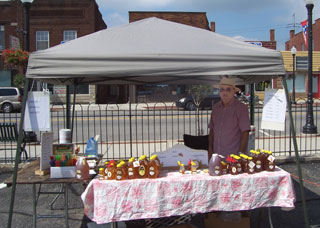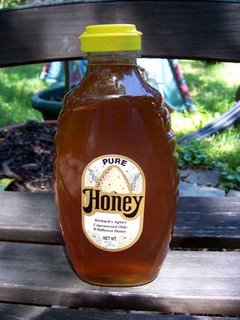Oh Where, Oh Where Did My Cleveland Bee Go?
 There is an old saying that says, ask and you shall receive. I personally think this saying should be updated to read “Ask, and for a small fee, you shall receive”, but today I was proven wrong. Yesterday, I wondered where the Cleveland bees had gone. I asked and a man named Richard Botamer, who did not even know I had asked, gave me the answer without even charging me a consulting fee.
There is an old saying that says, ask and you shall receive. I personally think this saying should be updated to read “Ask, and for a small fee, you shall receive”, but today I was proven wrong. Yesterday, I wondered where the Cleveland bees had gone. I asked and a man named Richard Botamer, who did not even know I had asked, gave me the answer without even charging me a consulting fee.
The universe works in odd ways sometimes. Now if only it was listening when I mention, REPEATEDLY, that I would like to win the lottery. *sigh*
But for now, I am just thrilled to have an answer to my bee question.
I met Mr. Botamer at my local fruit and veggie market. I had stopped by to pick up some fresh vegetables and he was there selling his locally made honey. I remembered that I had just recently used the last of my honey making barbeque sauce. So I stopped to pick up a jar.
Richard Botamer is what I would call a enthusiast. Some might even go so far as to call him a fanatic. He is passionate and dedicated to the cause of bees and locally made honey. He not only likes his bees but he is knowledgeable and, more importantly, is very keen on sharing that knowledge.
First of all, Mr. Botamer explained that honey bees are actually not native to the United States. They are immigrants from Europe and the wild ones are really just feral bees who escaped from the hives of domesticated life.
It had been this way for many, many decades in the United States. Domesticated and wild honey bees helped pollinate a vast majority of fruit trees and flowers in the US and were so common that they were more of an afterthought to the agriculural industry rather than considered a vital part.
Then, 1985, disaster struck the United States honey bee population. It was a pandemic honey bee illness and honey bees died by the hiveful. Suddenly what had been a thriving and taken for granted population was nearly gone. Many agricultural industries were affected.
It was discovered that what was killing the bees was a microscopic mite. This was the Varroa mite. To make matters worse, another mite called the Tracheal mite soon joined the mix and honey bees were fighting for their lives from two very deadly enemies. Unfortunately, those little wild honey bees from my youth were on the losing side of a nature war.
Did this bee massacre have to happen? Who knows. Honey bees are not native to the U.S. But neither are the mites that killed many of them off. According to Mr. Botamer, the mites hitched a ride on the migratory workers coming up from South America.
These days, the only honey bees in Cleveland are the ones that are kept domestically. Mr. Botamer told me that a wild hive has a life expectancy of 2 years, tops. Even domesticated honey bees are lucky if they get more than a few years before they too are decimated.
There are chemicals you can put in the hives, but not while they are producing honey for human consumption. Mr. Botamer said “I don’t want to put poison on my hives” so he opts not use chemicals of any kind at any time.
Instead, he is trying organic methods of controlling the mites. Currently he is using essential oils, specifically a thyme oil derivative, to help his honey bees fight off the mites. It doesn’t work 100% of the time, but he constantly experiments with many different ideas in the hopes that he can find something that works even better.
 There was one thing that Richard Botamer was particularly adamant about, and that was you should always buy locally produced honey. He told me that not only is the honey better for you, but it simply tastes better. Most store honey is produced in either China and Argentina, where laws on chemical use in the hive are fast and loose *coughnonexistantcough*. And store bought honey must go through a rigorous process which destroys the flavors of the honey itself.
There was one thing that Richard Botamer was particularly adamant about, and that was you should always buy locally produced honey. He told me that not only is the honey better for you, but it simply tastes better. Most store honey is produced in either China and Argentina, where laws on chemical use in the hive are fast and loose *coughnonexistantcough*. And store bought honey must go through a rigorous process which destroys the flavors of the honey itself.
A good locally produced honey will have a better flavor and you will, most likely, have a chance to talk to the beekeeper. If you know the beekeeper, you will know what methods the beekeeper uses to combat the mites, thus ensuring your honey is organic. A local beekeeper can also help steer you towards a better flavored honey.
“Honey is like tea or wine or anything else — the flavor changes with the flower sources.” said Mr. Botamer.
I, myself, bought a jar of Tulip Tree Honey, which is a rich, dark honey with a nice burst of flavor. I wonder if I can get Mr. Botamer to set up a hive in my neighborhood? I wouldn’t mind a jar of Hanna’s Bee Balm honey.
Richard Botamer is a professional beekeeper who runs Richard’s Apiary & Bee Products. His hives are located in Solon, Middlefield and many parts of Geauga County. He is a member of the Ohio Beekeepers Association, Medina Beekeepers Association and the Eastern Apiary.
You can read more about how to attract Honey Bee alternatives to your garden at Takoma Gardener.

Pingback: Dona: Hanna’s Tomato Tastings 2007 | This Garden Is Illegal
Could I use your article in our newsletter for February? I am the editor of the Cleveland Rose Society’s newsletter which is called The Thorn. We are having Mr. Botamer speak at our next meeting.
Neil Evans
PS If you would ever want to use any of my photos that appear on Flickr.com ncevans (People Search), you have my permission to do so.